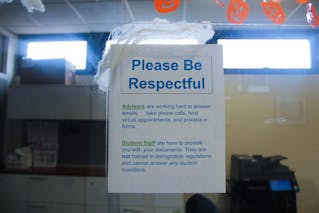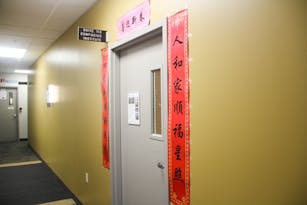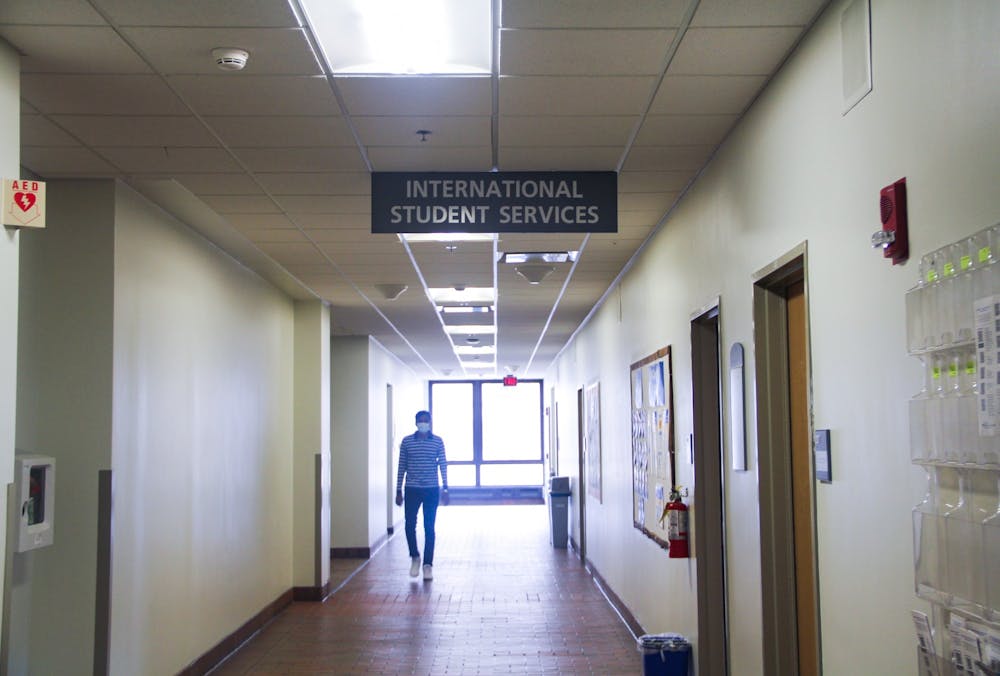Editor’s note: The Spectrum strives to include the name of sources in its stories, pursuant to the SPJ Code of Ethics. However, sometimes a story needs to be told, and the affected parties are unwilling to go on the record with their identities. In this case, the affected students expressed concern that their chances of returning to the U.S. would be jeopardized if their names appeared in print. As such, The Spectrum has decided to grant anonymity.
On Sept. 28, 37 international students had their F-1 visa statuses terminated for failing to submit an I-94 form within 30 days of their arrival on campus, thus revoking their legal immigration status. An I-94 form is a document detailing the arrival and departure of all-non U.S. citizens from the U.S.
International Student Services reached out over email to spread awareness of the upcoming deadline with students, according to the university. In multiple interviews with The Spectrum, impacted students said these email reminders didn’t always make it to the intended receiver.
Dai Jing*, a junior accounting major, was among those directly affected. She cited UB’s lack of communication as a reason why she overlooked such an important deadline.
“The most important emails [were] sent to our other email, not our UB email, [our] other emails we’d use when we applied for UB,” Jing said. “Some of us don’t regularly check our [personal] emails.”
In a statement, UB said it is aware of the situation and has dealt with issues like this in the past.
“It is not unusual to have anywhere from 15-30 students terminated from the program each year,” the university said. UB has more international students on campus this year than last because many international students took courses remotely in 2020-21, the university said in a statement about enrollment last week.
“UB is obligated to create an institutional standard for reporting this information to the Department of Homeland Security within 30 days from a student’s program start date. This includes proof of a valid F-1 entry into the U.S.”
According to sources with knowledge on this matter, around 27 Chinese students were impacted by the terminations. The Chinese Students and Scholars Association (CSSA) became aware of the incident on Sept. 30 and notified the Consulate General of China in New York soon after. Additionally, CSSA has since posted a summary of what happened to inform students of their potential status change.
After the summary began circulating, “We had students contacting us about their status as well as some lawyers who were willing to do counseling for the students,” CSSA said.
“UB’s ISS office works diligently to avoid terminating students… Those students who were terminated did not attend pre-arrival webinars, read pre-arrival newsletters, e-forms and emails, or attend immigration sessions. All of these educational opportunities explain the process, and how to comply with these regulations,” the university said in its statement.
In addition, CSSA confirmed the lack of uniformity when ISS informed students of their status changes.
“Some had holds [on their student accounts], some did not, the email notice was not sent to the accurate email address — some [students] did not receive their final notice in either one of the email they have on file, but in an email that they never officially provide to UB at all,” CSSA said. “One of the department directors also brought up that it would be great for ISS to inform the department, so they can help supervise their students when it comes to completing the international students check-ins.”
Emails are typically a less utilized form of communication in China compared to other nations, according to the BBC.
Pranav Misra*, a freshman economics student, says the email reporting her status termination, by contrast, particularly stood out in her inbox.

A sign in International Student Services extolls students to have patience when dealing with advisors and student staff.
“When I received my service termination email on Sept. 28, it was marked ‘high priority’ and written in bold and caps, so it was quite eye-catching,” Misra said. “I was just so busy with my classes that I never realized there was a deadline,” she said, tears streaming down her face.
“I really enjoyed learning at UB, it’s just so sudden, I just cannot absorb it. It was really hard moving across countries in a pandemic.”
Misra carried four suitcases weighing roughly 44 pounds each on her journey home from the U.S.
In an effort to eventually return to UB, she must reapply for a visa and has since requested an I-20 form, which she hopes to get in the next few weeks. U.S. Citizenship and Immigration Services requires valid I-20 paperwork showing that students are legitimately studying at the university. When it arrives, she must book two appointments with the U.S. Embassy in her home country, one concerning biometrics and one for a visa interview. This entire process can take 12-18 months, Misra said.
“If they had sent that status termination email a week earlier with bold caps and everything, many of us would have submitted it on time,” she said. “I only missed the deadline by a day. I wish the laws were a bit relaxed.”
Jing says her roommates were exposed to COVID-19 and she was in the process of changing her room when the termination emails were sent out.
“I heard other school’s students said they received too many emails about submitting this I-94… Other students and I think it’s very ridiculous. We lost our sense of home and belonging in UB,” Jing said.
Prior to joining the UB community, Misra had never left her home country.
“There was so much I had to take responsibility for,” Misra said. “It was my first time traveling away from home, so I had very little knowledge of life and immigration. Learning everything took time, there was a learning curve and it was hard. To be honest, it wasn’t an easy transition.”
At the time of her status termination, Misra was enrolled in seven classes at UB. In order to help her stay up-to-date on course material, some of her professors have shared recorded lectures, while others have agreed to hold joint office hours.
“Professors are really nice and accommodating, it’s just that I don’t know how things will work because all the classes will be at night [due to differing time zones],” Misra said. “So maybe I’ll have to shift my sleep [schedule].”
In the meantime, she wants to focus on herself: “I set goals for myself to practice yoga and be more responsible.”
Coming to the U.S. was a culture shock for Misra, who had never experienced the American lifestyle before.
“The U.S. has a very fast-paced environment, and my home country is a really slow country where parents really spoon-feed their children,” Misra said. “I have never been so independent, [and] I’ve never been in an unsupervised and unmonitored environment like UB.”

The Confucius Institute will be discontinued at the end of 2021.
SA president Nick Singh says he “heard about the situation.” The newly-elected e-board member says he is looking into the visa terminations and trying to find answers: “I do have a meeting next week coming up, but it’s just like actually understanding: what’s the reason for it and what could we do to support students with that situation?”
SA treasurer Austin Wolfgang says the e-board plans to help the affected students involved, but he acknowledged the importance of respecting students’ privacy.
“We are going to look into it and try to help the students as best we can,” Wolfgang said. “We’re not going to be able to discuss the results of any of that. That’s private student information.”
UB released a revised statement Tuesday expressing remorse for the terminations.
“We are sorry that this has happened to our students, for we endeavor to support our international students and facilitate their success at UB,” Nojin Kwak, vice provost for international education, said. “It is always very difficult to terminate a student’s immigration status, and we are working with the affected students to provide as much help as they need. They are receiving individualized advisement to address their specific situation and to help them make the best decision about their future studies. We will do whatever we can to assist them.”
While UB’s future handling of these situations is uncertain, Misra offered up plenty of suggestions.
“Next year maybe they could try to find more innovative ways to reach out to students,” Misra said. “My suggestion would be they could either call, or track them down in person or maybe have another committee handle the cases.”
Despite losing her visa, Misra holds no animosity toward ISS for their role.
“It’s a process, they have to do this… I have no complaints against ISS, [but] things could have been better,” Misra said.
*Student’s name was changed to protect their identity.
Grant Ashley contributed to the reporting.
Jack Porcari is the senior news/features editor and can be reached at jack.porcari@ubspectrum.com
Alex Falter is the senior arts editor and can be reached at alex.falter@ubspectrum.com

Jack Porcari is a senior news/features editor at The Spectrum. He is a political science major with a minor in journalism. Aside from writing and editing, he enjoys playing piano, flow arts, reptiles and activism.

Alex Falter is a senior arts editor at The Spectrum.





